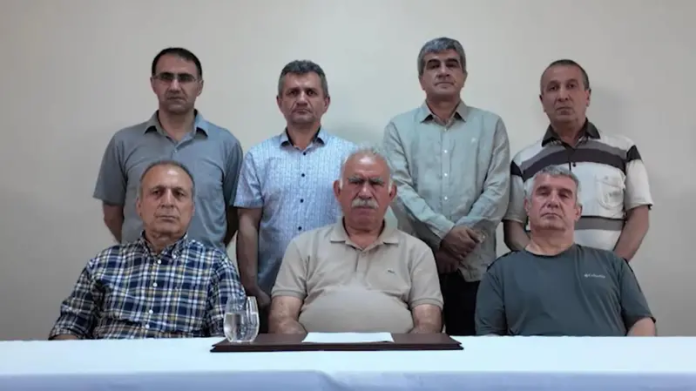Abdullah Öcalan, the imprisoned leader of the Kurdistan Workers’ Party (PKK), renewed his call for fighters to abandon armed struggle in a seven-minute video message broadcast on Medya Haber’s YouTube channel.
The appeal comes days before a planned symbolic disarmament ceremony in northern Iraq, marking a pivotal moment in peace efforts with Turkey after four decades of conflict. Flanked by fellow inmates, Öcalan declared the peace initiative had reached a stage requiring concrete action:
It should be considered natural for you to publicly ensure the disarmament of the relevant groups in a way that addresses the expectations of the (Turkish parliament) and its commission, dispels public doubts, and fulfills our commitments. I believe in the power of politics and social peace, not weapons. And I call on you to put this principle into practice.
This follows his February call for the PKK to convene a congress and formally dissolve itself, a demand that prompted the group’s May announcement to disband and renounce violence.
Öcalan’s message specifically targets hesitant fighters, acknowledging internal resistance to abandoning armed struggle. His appeal carries significant weight despite his 25-year imprisonment, as he remains the ideological figurehead of the Kurdish movement.
In response to Öcalan’s directives, a group of 20-30 PKK fighters will descend from their mountain bases in northern Iraq this week to lay down weapons in Sulaymaniyah. PKK spokesman Zagros Hiwa confirmed the ceremony would occur under supervision of civil society institutions and interested parties, with weapons burned rather than handed to authorities, a departure from earlier plans for transfer to regional officials.
The location in Iraq’s semi-autonomous Kurdish region holds strategic significance, as Sulaymaniyah is governed by the Patriotic Union of Kurdistan (PUK), which maintains closer ties to the PKK than the rival Kurdistan Democratic Party. This comes despite Iraq’s nationwide ban on the PKK last year and ongoing Turkish military operations against PKK positions in northern Iraq, where Ankara has established multiple bases.
